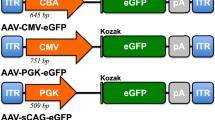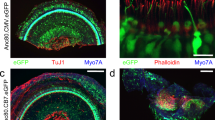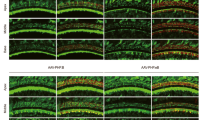Abstract
The aims of this study were to evaluate the expression of enhanced green fluorescent protein (EGFP) driven by 6 different promoters, including cytomegalovirus IE enhancer and chicken β-actin promoter (CAG), cytomegalovirus promoter (CMV), neuron-specific enolase promoter (NSE), myosin 7A promoter (Myo), elongation factor 1α promoter (EF-1α), and Rous sarcoma virus promoter (RSV), and assess the dose response of CAG promoter to transgene expression in the cochlea. Serotype 1 adeno-associated virus (AAV1) vectors with various constructs were transduced into the cochleae, and the level of EGFP expression was examined. We found the highest EGFP expression in the inner hair cells and other cochlear cells when CAG promoter was used. The CMV and NSE promoter drove the higher EGFP expression, but only a marginal activity was observed in EF-1α promoter driven constructs. RSV promoter failed to driven the EGFP expression. Myo promoter driven EGFP was exclusively expressed in the inner hair cells of the cochlea. When driven by CAG promoter, reporter gene expression was detected in inner hair cells at a dose as low as 3 x 10(7) genome copies, and continued to increase in a dose- dependent manner. Our data showed that individual promoter has different ability to drive reporter gene expression in the cochlear cells. Our results might provide important information with regard to the role of promoters in regulating transgene expression and for the proper design of vectors for gene expression and gene therapy.
Similar content being viewed by others
Article PDF
Author information
Authors and Affiliations
Rights and permissions
This is an Open Access article distributed under the terms of the Creative Commons Attribution Non-Commercial License (http://creativecommons.org/licenses/by-nc/3.0/) which permits unrestricted non-commercial use, distribution, and reproduction in any medium, provided the original work is properly cited.
About this article
Cite this article
Liu, Y., Okada, T., Nomoto, T. et al. Promoter effects of adeno-associated viral vector for transgene expression in the cochlea in vivo. Exp Mol Med 39, 170–175 (2007). https://doi.org/10.1038/emm.2007.19
Published:
Issue date:
DOI: https://doi.org/10.1038/emm.2007.19
Keywords
This article is cited by
-
Distributional comparison of different AAV vectors after unilateral cochlear administration
Gene Therapy (2024)
-
Adeno-associated virus vector enables safe and efficient Cas9 activation in neonatal and adult Cas9 knockin murine cochleae
Gene Therapy (2020)
-
Transgenic Tmc2 expression preserves inner ear hair cells and vestibular function in mice lacking Tmc1
Scientific Reports (2018)
-
Adeno-associated virus-mediated gene transfer targeting normal and traumatized mouse utricle
Gene Therapy (2014)
-
A compact dual promoter adeno-associated viral vector for efficient delivery of two genes to dorsal root ganglion neurons
Gene Therapy (2014)



